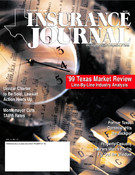Plans are underway for Unistar Insurance Co.’s charter to be sold to Agricultural Workers Mutual Auto Insurance Co., a 52-year-old mutual based in Fort Worth for $50,000.
Negotiation of the sale began in the weeks before Unistar ran into serious trouble with the Texas Department of Insurance and have continued with the TDI-appointed receiver.
Richard Peck, vice president and treasurer for Ag. Workers Mutual, says buying an existing charter should save the company a year in paperwork, but emphasized they will be purchasing the charter only. He expects the sale to be complete within six months.
Ag. Workers Mutual consistently turn in a book of business around $26.6 million, with policy counts between 20,000 and 22,000. The company’s bylaws require all policyholders to hold degrees in agriculture and because the agriculture industry is shrinking, there are few new prospects for the program.
Policyholders, who own the company, “aren’t about to change the bylaws” to allow others to participate as they consistently earn annual dividends over 25 percent, Peck said.
The mutual plans to add auto liability to the charter and then offer full auto coverage in Texas. The company does not plan on using agents and expects the new company to outgrow the mutual company in five to ten years.
“We have to turn 100 to 200 potential policyholders away each year because of the agriculture degree requirement,” Peck said. “And that’s without even trying.” Peck says they believe they will be able to grow the non-mutual book without much additional effort and any further expansion would be into Oklahoma.
Though the charter will most likely change hands, the liabilities remain Unistar’s responsibilities. Among them is a pending class action lawsuit that alleges Unistar executives misrepresented certain assets, strategies and earnings, leading to inflated stock values.
The stock price plummeted last summer, was pulled off of the American Exchange and today trades sporadically on bulletin boards for less than $1 share. At its peak, Unistar was trading near $60 a share.
A cause of action was filed Aug. 16 and included allegations made by the U.S. Securities Exchange Commission.
The SEC order deals primarily with the manipulation of stock values by giving false and misleading information. It also alleges transfers of shares were done without proper registration statements and without seeking an SEC exemption.
The lawsuit, which individually names Marc. A. Sparks, F. Jeffrey Nelson, and Nicole Caver, makes many other assertions of interest to stockholders.
Sparks, who served as Unistar’s chairman and CEO, purportedly disposed of 4.2 million shares of common stock, representing 63 percent of his total share holdings. Plaintiff attorneys believe the shares netted Sparks in excess of $85 million.
Nelson, who served as president, CFO and treasurer, disposed of 5.4 million shares, representing 81 percent of his holdings, for an alleged $100 million. Caver disposed of 100 percent of her shares, or 6.6 million shares.
The suit alleges that the executive team’s misrepresentations were done so that they could sell off the 16.2 million shares at inflated values, among other things.
Karlins Arnold & Corbit (KAC), an independent auditor, was named in the suit, as well. KAC audited Unistar’s 1998 financial results. They replaced another auditing firm, DBO Dunwoody LLP, which resigned from its agreement with Unistar.
The suit alleges that problems were evident to KAC, and that they violated the principles of GAAP and GAAS numerous times, either knowingly or with reckless disregard of the truth.
A court date has yet been set for the class action.
Topics Lawsuits Agribusiness
Was this article valuable?
Here are more articles you may enjoy.


 Former Ole Miss Standout Player Convicted in $194M Medicare, CHAMPVA Fraud
Former Ole Miss Standout Player Convicted in $194M Medicare, CHAMPVA Fraud  Zurich Insurance’s Beazley Bid Sets the Stage for More Insurance Deals
Zurich Insurance’s Beazley Bid Sets the Stage for More Insurance Deals  Howden-Driven Talent War Has Cost Brown & Brown $23M in Revenue, CEO Says
Howden-Driven Talent War Has Cost Brown & Brown $23M in Revenue, CEO Says  Married Insurance Brokers Indicted for Allegedly Running $750K Fraud Scheme
Married Insurance Brokers Indicted for Allegedly Running $750K Fraud Scheme 


